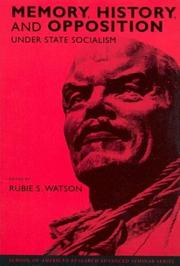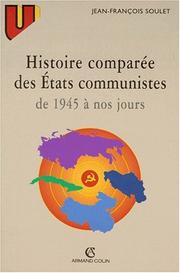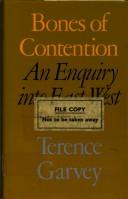| Listing 1 - 10 of 15 | << page >> |
Sort by
|
Book
ISBN: 9004291458 9789004291454 9789004291447 900429144X Year: 2016 Publisher: Leiden Boston
Abstract | Keywords | Export | Availability | Bookmark
 Loading...
Loading...Choose an application
- Reference Manager
- EndNote
- RefWorks (Direct export to RefWorks)
The break-up of the Soviet Union is a key event of the twentieth century. The 39th IIS congress in Yerevan 2009 focused on causes and consequences of this event and on shifts in the world order that followed in its wake. This volume is an effort to chart these developments in empirical and conceptual terms. It has a focus on the lands of the former Soviet Union but also explores pathways and contexts in the Second World at large. The Soviet Union was a full scale experiment in creating an alternative modernity. The implosion of this union gave rise to new states in search of national identity. At a time when some observers heralded the end of history, there was a rediscovery of historical legacies and a search for new paths of development across the former Second World. In some parts of this world long-repressed legacies were rediscovered. They were sometimes, as in the case of countries in East Central Europe, built around memories of parliamentary democracy and its replacement by authoritarian rule during the interwar period. Some legacies referred to efforts at establishing statehood in the wake of the First World War, others to national upheavals in the nineteenth century and earlier. In Central Asia and many parts of the Caucasus the cultural heritage of Islam in its different varieties gave rise to new markers of identity but also to violent contestations. In South Caucasus, Georgia, Armenia and Azerbaijan have embarked upon distinctly different, but invariably contingent, paths of development. Analogously core components of the old union have gone through tumultuous, but until the last year and a half largely bloodless, transformations. The crystallization of divergent paths of development in the two largest republics of that union, id est Russia and Ukraine, has ushered in divergent national imaginations but also in series of bloody confrontations.
Post-communism --- Social change --- Change, Social --- Cultural change --- Cultural transformation --- Societal change --- Socio-cultural change --- Social history --- Social evolution --- Former communist countries --- Former Soviet bloc --- Second world (Former communist countries) --- Communist countries --- Social conditions.
Book
ISBN: 9780521112406 9780521129176 0521112400 0521129176 9780511844867 0511844867 Year: 2010 Publisher: Cambridge Cambridge University
Abstract | Keywords | Export | Availability | Bookmark
 Loading...
Loading...Choose an application
- Reference Manager
- EndNote
- RefWorks (Direct export to RefWorks)
"This book tells the dramatic story of the economic, social, political, and cultural transformation of Europe during the transition from the Cold War to European Union. Ivan Berend charts, in particular, the overwhelming impact of the collapse of communism on every aspect of European life. Europe became safer and more united, and central and eastern Europe started on the difficult road to economic modernization. However, the western half of Europe also changed. European integration gained momentum. The single market and the common currency were introduced, and the Union enlarged from nine to twenty-seven countries. This period also saw a revolution in information and communication technology, the increasing impact of globalization, and the radical restructuring of the political system. The book explores the impact of all of these changes as well as the new challenges posed by the economic crisis of 2008-9 and asks which way now for Europe?"--Provided by publisher.
History of Europe --- anno 1980-1989 --- anno 1990-1999 --- anno 2000-2009 --- Technological innovations --- Innovations --- Economic aspects --- Aspect économique --- European Union countries --- Former communist countries --- Pays de l'Union européenne --- Anciens pays communistes --- Social conditions --- Economic integration --- Relations --- Conditions sociales --- Intégration économique --- Europe --- History --- EUR / Europe - Europa --- EEC / European Union - EU -Europese Unie - Union Européenne - UE --- EEU / Central & Eastern Europe --- 92 --- 338 <09> <4> --- Geschiedenis. --- Economische geschiedenis--Europa --- 338 <09> <4> Economische geschiedenis--Europa --- Histoire. --- History. --- 92 Geschiedenis. --- 92 Histoire. --- 92 History. --- Aspect économique --- Pays de l'Union européenne --- Intégration économique --- Geschiedenis --- Former Soviet bloc --- Second world (Former communist countries) --- Communist countries --- Council of Europe countries --- Eastern Hemisphere --- Eurasia --- EU countries --- Euroland --- Arts and Humanities --- Technological innovations - Economic aspects - Europe --- Europe - Social conditions - 20th century --- Europe - Social conditions - 21st century --- European Union countries - Economic integration - History - 20th century --- European Union countries - Relations - Former communist countries
Book
ISBN: 9781137466310 1137466316 9781349499809 1336190736 1349499803 1137466324 9781137466327 Year: 2015 Publisher: Houndmills, Basingstoke, Hampshire New York, NY Palgrave Macmillan
Abstract | Keywords | Export | Availability | Bookmark
 Loading...
Loading...Choose an application
- Reference Manager
- EndNote
- RefWorks (Direct export to RefWorks)
"This book provides a comprehensive overview and explanation of the substance of the European Union's (EU) democracy promotion policy. With the promotion of democracy becoming an increasingly important element of European Union foreign policy, the contributors argue that the question of what is actually being promoted by the EU in third countries must come to the fore of academic and practical discussions. Dealing with the democratic agenda promoted by the EU, this collection focuses on elections, civil and political rights, horizontal accountability, effective power to govern, stateness, state administrative capacity, civil society, and socio-economic development as components of embedded liberal democracy. The conceptual part of the book includes an analytical framework and critical discussions from law, political economy, critical social theory and governance perspectives. The empirical part contains 11 chapters where the common analytical framework is applied to 22 country cases"--
Democracy --- Democratization --- Democratic consolidation --- Democratic transition --- Political science --- New democracies --- Self-government --- Equality --- Representative government and representation --- Republics --- Government policy --- European Union countries --- Former communist countries --- Developing countries --- Emerging nations --- Fourth World --- Global South --- LDC's --- Least developed countries --- Less developed countries --- Newly industrialized countries --- Newly industrializing countries --- NICs (Newly industrialized countries) --- Third World --- Underdeveloped areas --- Underdeveloped countries --- Former Soviet bloc --- Second world (Former communist countries) --- Communist countries --- EU countries --- Euroland --- Europe --- Foreign relations. --- Politics and government. --- Relations --- #SBIB:324H60 --- #SBIB:327.7H233 --- Politieke socialisatie --- Europese Unie: externe relaties, buitenlands- en defensiebeleid (ook WEU)

ISBN: 093345287X 0933452861 Year: 1994 Volume: *6 Publisher: Santa Fe School of American research press
Abstract | Keywords | Export | Availability | Bookmark
 Loading...
Loading...Choose an application
- Reference Manager
- EndNote
- RefWorks (Direct export to RefWorks)
Communist countries --- Pays communistes --- Historiography --- Historiographie --- S04/0200 --- S06/0405 --- China: History--Historiography and theory of history --- China: Politics and government--CCP, history and ideology: general --- Iron curtain lands --- Russian satellites --- Second world (Communist countries) --- Soviet bloc --- Former communist countries --- Historiography. --- Communist countries - Historiography.

ISBN: 2200014651 9782200014650 Year: 1996 Volume: 324 Publisher: Paris Colin
Abstract | Keywords | Export | Availability | Bookmark
 Loading...
Loading...Choose an application
- Reference Manager
- EndNote
- RefWorks (Direct export to RefWorks)
Communisme --- --1945-1990 --- --Europe de l'Est --- --Cuba --- --URSS, --- République populaire chinoise --- --Corée du Nord --- Viêt-Nam --- --3346 --- Communist countries --- History --- -Iron curtain lands --- Russian satellites --- Second world (Communist countries) --- Soviet bloc --- Former communist countries --- -History --- Iron curtain lands --- History. --- --Viêt-Nam --- --Communist countries --- Europe de l'Est --- Cuba --- URSS, 1922-1991 --- Corée du Nord --- Communist countries - History

ISBN: 0710000103 Year: 1978 Publisher: London Routledge and Kegan Paul
Abstract | Keywords | Export | Availability | Bookmark
 Loading...
Loading...Choose an application
- Reference Manager
- EndNote
- RefWorks (Direct export to RefWorks)
327.5 --- Communist countries --- World politics --- -World politics --- -#SBIB:327.6H30 --- Colonialism --- Global politics --- International politics --- Political history --- Political science --- World history --- Eastern question --- Geopolitics --- International organization --- International relations --- Internationale conflicten. Internationale spanningen. Internationale blokvorming. Veiligheidspolitiek --- Internationale en diplomatieke relaties: periode 1945 - 1989 --- 327.5 Internationale conflicten. Internationale spanningen. Internationale blokvorming. Veiligheidspolitiek --- #SBIB:327.6H30 --- Communist countries. --- Iron curtain lands --- Russian satellites --- Second world (Communist countries) --- Soviet bloc --- Former communist countries
Book
ISBN: 0140806229 9780140806229 Year: 1976 Publisher: Harmondsworth Penguin books
Abstract | Keywords | Export | Availability | Bookmark
 Loading...
Loading...Choose an application
- Reference Manager
- EndNote
- RefWorks (Direct export to RefWorks)
330.342 --- Marxian economics --- -Marxist economics --- Communism --- Schools of economics --- Socialism --- Economische ontwikkeling. Groeistadia --- Addresses, essays, lectures --- Europe, Eastern --- Communist countries --- -Iron curtain lands --- Russian satellites --- Second world (Communist countries) --- Soviet bloc --- Former communist countries --- East Europe --- Eastern Europe --- Economic policy --- -Addresses, essays, lectures. --- -Addresses, essays, lectures --- Marxian economics. --- -Economische ontwikkeling. Groeistadia --- -Economic policy --- 330.342 Economische ontwikkeling. Groeistadia --- -330.342 Economische ontwikkeling. Groeistadia --- Marxist economics --- Economic policy. --- Economic schools --- Europe, Eastern - Economic policy --- Communist countries - Economic policy
Book
ISBN: 9782804162375 2804162370 Year: 2012 Publisher: Bruxelles De Boeck
Abstract | Keywords | Export | Availability | Bookmark
 Loading...
Loading...Choose an application
- Reference Manager
- EndNote
- RefWorks (Direct export to RefWorks)
Communism --- Communisme --- Former communist countries --- Anciens pays communistes --- Politics and government --- Politique et gouvernement --- Post-communism --- Europe [Eastern ] --- History --- 1989 --- -Europe [Eastern ] --- -Post-communism --- -Communism --- -EEU / Central & Eastern Europe --- 321.1 --- 323.0 --- 330.540 --- Theorie, ontstaan en evolutie van de staat. --- Binnenlandse politiek: algemeenheden. --- Socialistische stelsels: algemeenheden. --- EEU / Central & Eastern Europe --- Theorie, ontstaan en evolutie van de staat --- Binnenlandse politiek: algemeenheden --- Socialistische stelsels: algemeenheden --- Géopolitique --- Europe --- Europe de l'Est --- Histoire --- 1989-....

ISBN: 0943875358 Year: 1992 Publisher: Washington, D.C. Baltimore Woodrow Wilson Center Press Johns Hopkins University Press
Abstract | Keywords | Export | Availability | Bookmark
 Loading...
Loading...Choose an application
- Reference Manager
- EndNote
- RefWorks (Direct export to RefWorks)
Post-communism --- Post-communisme --- Postcommunisme --- Communist countries --- -Post-communism --- World politics --- -#SBIB:328H26 --- #SBIB:328H27 --- #SBIB:LICOS --- Colonialism --- Global politics --- International politics --- Political history --- Political science --- World history --- Eastern question --- Geopolitics --- International organization --- International relations --- Postcommunism --- Communism --- Politics and government --- Instellingen en beleid: USSR (actuele geschiedenis van de USSR: tot 1989) --- Instellingen en beleid: Midden- en Centraal Europa: algemeen --- -Iron curtain lands --- Russian satellites --- Second world (Communist countries) --- Soviet bloc --- Former communist countries --- Economic policy --- -Economic policy --- 1985-1995 --- World politics - 1985-1995. --- #SBIB:328H26 --- Economic policy. --- Politics and government.
Book
ISBN: 9781780682600 9781780685687 1780682603 1780685688 Year: 2015 Volume: 18 Publisher: Antwerp Intersentia
Abstract | Keywords | Export | Availability | Bookmark
 Loading...
Loading...Choose an application
- Reference Manager
- EndNote
- RefWorks (Direct export to RefWorks)
This volume considers the important and timely question of criminal justice as a method of addressing state violence committed by non-democratic regimes. The book's main objectives concern a fresh, contemporary, and critical analysis of transitional criminal justice as a concept and its related measures, beginning with the initiatives that have been put in place with the fall of the Communist regimes in Europe in 1989.The project argues for rethinking and revisiting filters that scholars use to interpret main issues of transitional criminal justice, such as: the relationship between judicial accountability, democratisation and politics in transitional societies; the role of successor trials in rewriting history; the interaction between domestic and international actors and specific initiatives in shaping transitional justice; and the paradox of time in enhancing accountability for human rights violations. In order to accomplish this, the volume considers cases of domestic accountability in the post-1989 era, from different geographical areas, such as Europe, Asia and Africa, in relation to key events from various periods of time. In this way the approach, which investigates space and time-lines in key examples, also takes into account a longitudinal study of transitional criminal justice itself. About the book'Transitional justice nowadays is an industry which produces hundreds of texts each year and it is difficult to turn our attention to an intellectual product. This book is well-balanced and will find recognition in readers and students of transitional justice, as well as researchers on social transformation. It is a collection in the best tradition of socio-legal research. The book is recommended for two reasons: its serious treatment of criminal justice as a part of transitional justice, and its approach, which locates the problem of transitional justice in post-communist Europe in a broader, comparative context.' Prof. Dr. Adam Czarnota, Scientific Director of the International Institute for the Sociology of Law, Oati, Spain'By carefully considering how criminal justice relates to democratization, collective memory, internationalist concerns, and the passage of time since violations occurred, this volume contributes importantly to the evolving transitional justice literature. The questions it raises are timely and theoretically grounded, and the choice of cases diverse and illuminating. Its authors richly contextualize their examinations, complementing recent broad comparative studies that explore large numbers of cases with little detail. This in-depth study critically advances our understanding of the challenges of justice on the fraught terrain of transitioning societies.' Nadya Nedelsky, Associate Professor and Chair, International Studies, Macalester College, Saint Paul, MN.'A collection of provocative, thoughtful and superbly documented contributions to our understanding of the dilemmas of transitional justice in post-dictatorial societies. The authors argue that democratic communities cannot function properly if they do not address past crimes and abuses. Genuine reconciliation cannot take place if memory and justice are ignored and denied. With its insightful comparative perspective, this book is highly recommended to all those who care about the relationship between human rights and democracy.' Vladimir Tismaneanu, University of Maryland (College Park)
Compensation for victims of crime --- Criminal justice [Administration of ] --- Criminal restitution --- Genoegdoening --- Genoegdoening (Strafrechtspraak) --- Indemnisation des victimes d'infractions --- Justice criminelle [Administration de la ] --- Justice transactionnelle --- Justice transitionnelle --- Overgang rechtvaardigheid --- Overgangsrechtvaardigheid --- Reparation --- Restitution (Criminal justice) --- Restitution for victims of crime --- Restitutions (Droit pénal) --- Réparation (Justice criminelle) --- Réparation civile --- Réparation d'un tort --- Strafrechtspraak [Administratie van de ] --- Victimes d'infractions--Indemnisation --- Génocide --- Études comparatives --- Postwar reconstruction --- Criminal justice, Administration of. --- Remedies (Law) --- Former Soviet bloc --- Transitional justice. --- Human rights. --- Reparation (Criminal justice) --- Administration of criminal justice --- Criminal justice, Administration of --- Basic rights --- Civil rights (International law) --- Human rights --- Rights, Human --- Rights of man --- Law and legislation. --- Law and legislation --- Former communist countries --- Second world (Former communist countries) --- Politics and government. --- Polemology --- Law of armed conflicts. Humanitarian law --- Criminology. Victimology --- Justice pénale --- Administration --- Participation des citoyens --- Transitional justice --- Génocide. --- Administration. --- Études comparatives. --- Participation des citoyens. --- Justice, Administration of --- Crime --- Criminal law --- Criminals --- Human security --- Truth commissions --- Justice --- Communist countries --- Post-conflict reconstruction --- Reconstruction, Postwar --- Justice pénale --- Génocide. --- Études comparatives.
| Listing 1 - 10 of 15 | << page >> |
Sort by
|

 Search
Search Feedback
Feedback About UniCat
About UniCat  Help
Help News
News